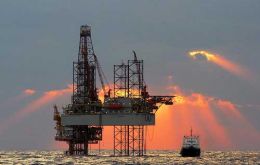MercoPress. South Atlantic News Agency
Stories for April 24th 2008
-
Thursday, April 24th 2008 - 21:00 UTC
Latam forecasted to expand 4.7% in 2008; Argentina 7%
Latin America's economy will grow at 4.7% in 2008 compared with 5.7% last year, the United Nations Latin American and Caribbean Economic Commission, CEPAL, estimated this week, reaffirming growth targets trimmed in March.
-
Thursday, April 24th 2008 - 21:00 UTC
Hillary and Obama determined to fight to the very end
Hopefuls Hillary Clinton and Barack Obama entered Wednesday the final phase of the US Democratic presidential primary with Clinton saying her decisive Pennsylvania win proved she was the best candidate to beat Republican John McCain in the race for the White House.
-
Thursday, April 24th 2008 - 21:00 UTC
Chileans among most intolerant towards immigration
Chile is one of the most intolerant Latinamerican countries with respect to immigration, according to a survey published late last week by the pollster Latinobarometro.
-
Thursday, April 24th 2008 - 21:00 UTC
US willing to help Argentina reach accord with Paris Club
Argentina is too an important country to be left out of international money markets, said US Under Secretary of State for Latinamerica Thomas Shannon following his recent visit to Argentina when he met with President Cristina Fernandez de Kirchner.
-
Thursday, April 24th 2008 - 21:00 UTC
Battered Chilean salmon industry targets Magallanes
Chile's Magallanes XII Region in the extreme south of the country looks to play an increasingly active role in Chile's 2.2 billion US dollars salmon industry as overcrowding and disease problems in Region X have producers looking south for greener pastures.
-
Thursday, April 24th 2008 - 21:00 UTC
Outside support for beleaguered Bolivian president Evo Morales
Leaders from four Latin American countries rejected Wednesday a controversial autonomy bid by a region of Bolivia, which was described by |President Evo Morales as “illegal” and intended to destabilize the country.
-
Thursday, April 24th 2008 - 21:00 UTC
Uruguayan pleads guilty of acting as Chavez agent in US
The Uruguayan national Wanseele Paciello, 40, pleaded guilty before a federal US court in Miami of acting as an agent for the government of Venezuelan President Hugo Chavez in covering up a plot to influence Argentina's presidential election.
-
Thursday, April 24th 2008 - 21:00 UTC
North Falklands Basin oil pre-drilling campaign begins

Rockhopper Exploration plc announced it was moving to the final phase prior to the drilling campaign for hydrocarbons in the North Falkland Basin which will involve two to four wells out of a potential of eight with another company.
-
Thursday, April 24th 2008 - 21:00 UTC
Lack of rains forecasts energy rationing in Chile
Chile seems to be inevitably heading for a serious energy shortage in the coming months with electricity rationing almost a certain possibility because of the hydrological conditions suffered by the country under the full impact of the Pacific Ocean La Niña current.
-
Thursday, April 24th 2008 - 21:00 UTC
Economist links lower US rates with soaring oil, food prices
Surging commodity price inflation should deter the United States central bank, the Federal Reserve from cutting its benchmark lending rate below 2%, suggested National Bureau of Economic Research President Martin Feldstein on Tuesday.
